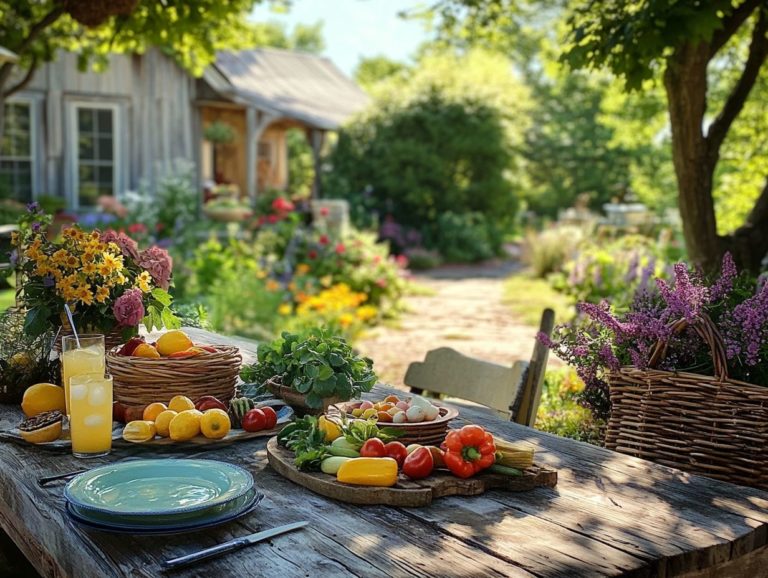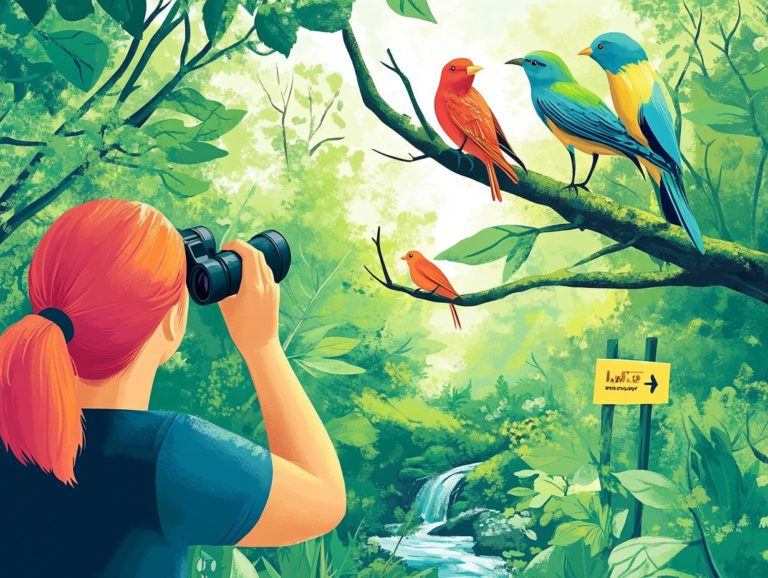Cultural Exchange: Learning and Eco-Conscious Travel
Cultural exchange is a powerful way to connect diverse communities. It helps people understand and appreciate different cultures, especially through sustainable tourism.
This article explores the meaning and importance of cultural exchange. It highlights personal growth, global awareness, and the positive impact on local culture.
You ll discover practical tips for respecting local customs and overcoming challenges like language barriers. This guidance empowers you to make the most of your enriching experiences.
Contents
- Key Takeaways:
- Understanding Cultural Exchange
- Benefits of Learning Through Cultural Exchange
- Eco-Conscious Travel and Cultural Exchange
- Practical Tips for Engaging in Cultural Exchange
- Challenges and Solutions for Cultural Exchange
- Frequently Asked Questions
- What is cultural exchange?
- Why is cultural exchange important?
- What is the role of learning in cultural exchange?
- How does eco-conscious travel contribute to cultural exchange?
- What are some ways to engage in cultural exchange while traveling?
- How can cultural exchange through travel benefit both travelers and host communities?
Key Takeaways:
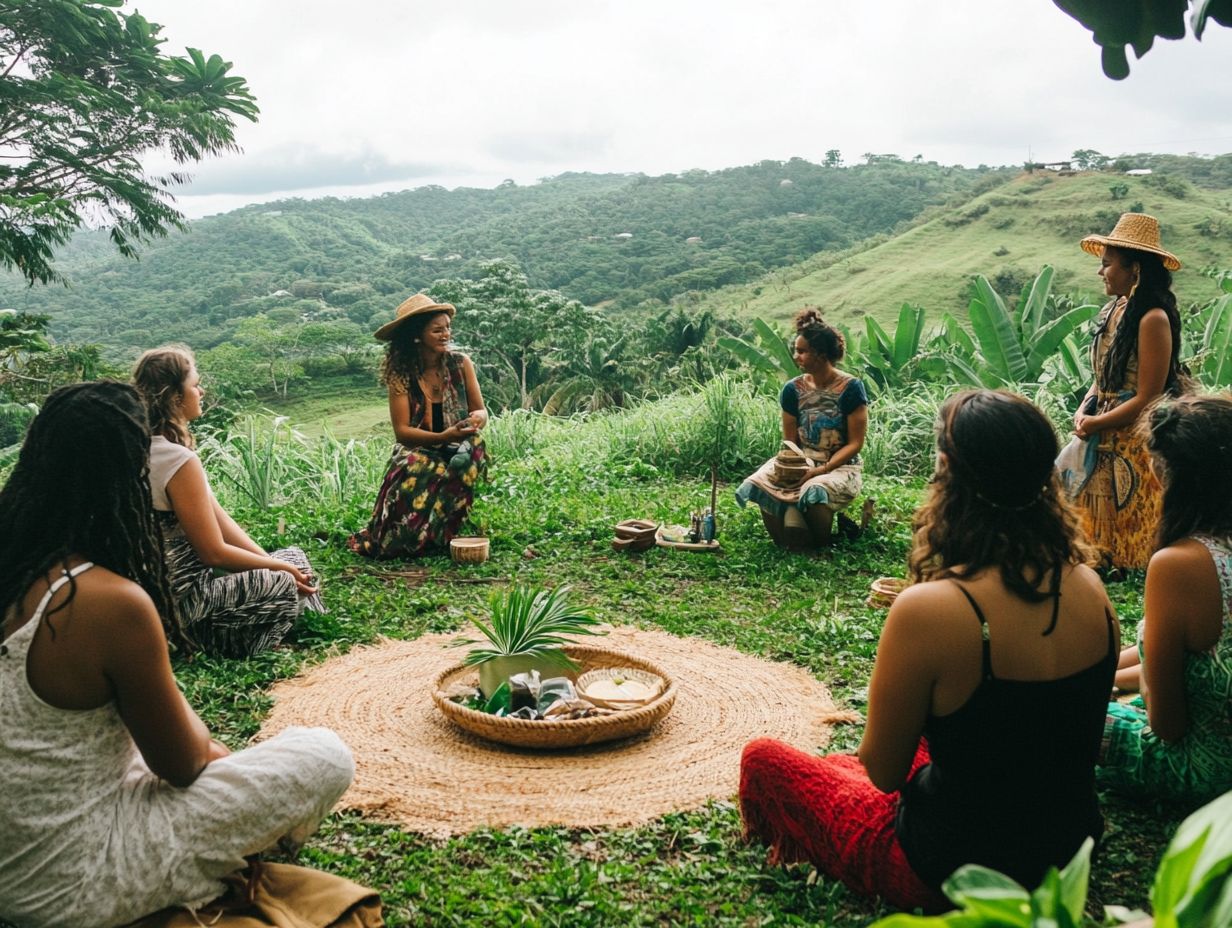
- Cultural exchange promotes personal growth and global understanding, making it essential for travel.
- Respecting local customs fosters sustainable and eco-conscious practices.
- Language barriers can be overcome by being open-minded and eager to learn.
Understanding Cultural Exchange
Cultural exchange is key to sustainable tourism. It allows you to share experiences and build respect for local cultures.
The World Tourism Organization emphasizes this role, especially in supporting eco-tourism. This approach increases awareness and directs resources to local communities.
Immerse yourself in the vibrant local traditions, cuisine, and practices. This fosters sustainable initiatives that celebrate local culture and support local businesses.
Definition and Importance
Cultural exchange lets you learn from each other’s backgrounds. It builds mutual respect and understanding in sustainable tourism.
This interaction enriches your travel experiences and deepens your appreciation for local customs and traditions. It helps preserve the unique identities of the communities you visit.
Engaging with locals boosts your sense of stewardship toward the environment. It promotes eco-tourism practices focused on conservation and sustainability.
Benefits of Learning Through Cultural Exchange
Participating in cultural exchange offers numerous benefits. It promotes personal growth and enhances your global understanding.
This experience enables you to appreciate diverse perspectives and see how local culture shapes tourism.
Personal Growth and Global Understanding
Cultural exchange helps you grow as a person. It introduces you to fresh ideas and practices while enhancing your understanding of the world. This experience helps you build bridges between diverse communities.
These interactions help you appreciate different perspectives, nurturing empathy and respect along the way. For instance, when a student participates in an exchange program, they often return with a richer understanding of the challenges faced by their peers in another country. This encourages a more inclusive mindset.
Community events that celebrate diverse cultures strengthen relationships and collaboration among locals. They showcase the beauty of food, music, and traditions. Engaging in these experiences equips you with valuable skills like adaptability and communication, essential for thriving in our interconnected global society and contributing to Earth conservation.
Eco-Conscious Travel and Cultural Exchange
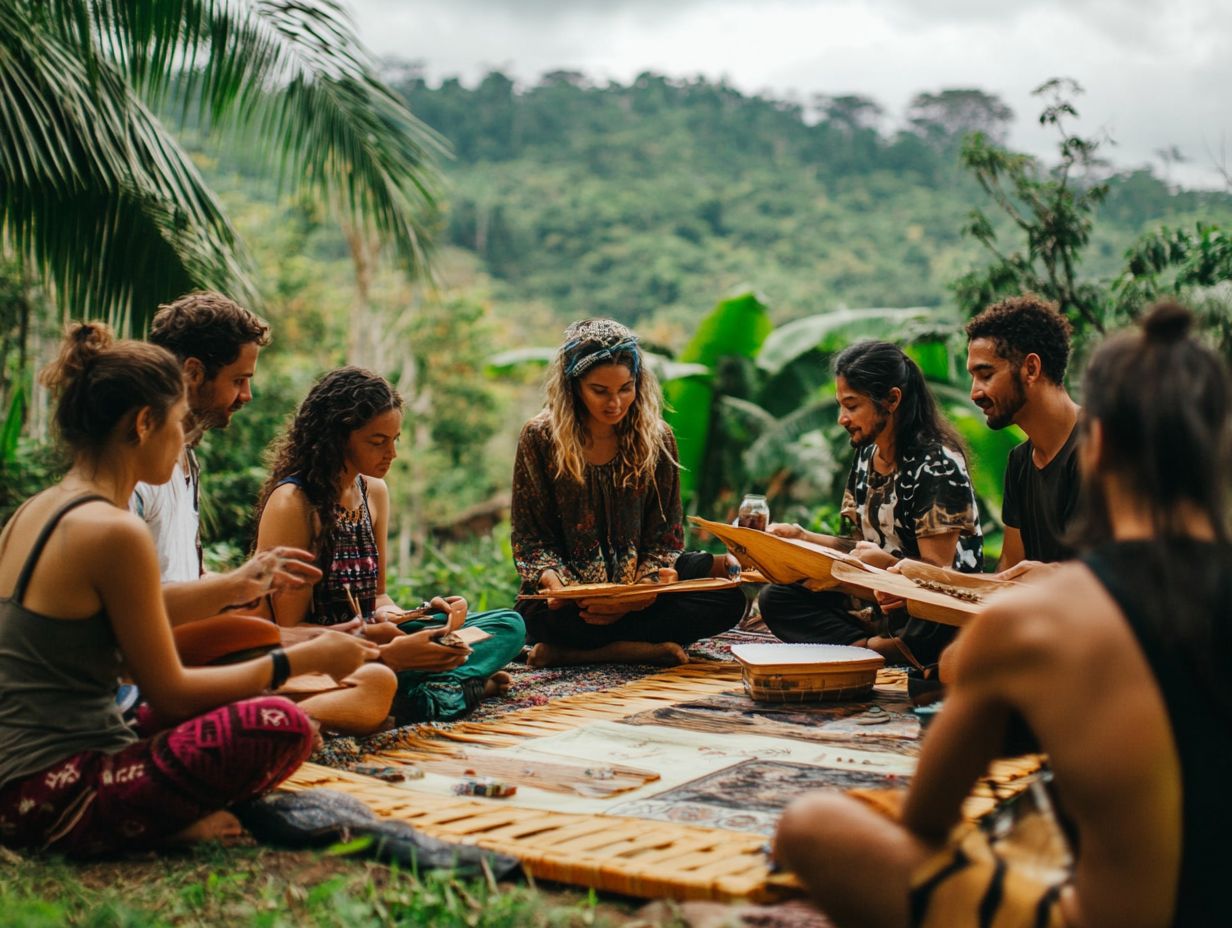
Eco-conscious travel harmonizes beautifully with cultural exchange. Both embrace sustainable tourism practices that enrich local communities and foster responsible interaction with the environment.
How Cultural Exchange Can Promote Sustainable Travel
Cultural exchange acts as a powerful catalyst for sustainable travel. It encourages you to support local communities and businesses, fostering economic resilience and environmental sustainability, especially through eco-tourism initiatives.
When you engage with local traditions and practices, you enrich your own experiences and contribute to the livelihoods of residents. For instance, by participating in workshops led by talented local artisans or opting for homestays instead of standard hotels, you immerse yourself in the culture while ensuring that your spending benefits the community.
Eco-tourism initiatives, like guided nature walks or delightful farm-to-table dining experiences, create a symbiotic relationship in which both you and the locals can thrive. Engaging in local history through eco-conscious travel helps preserve the environment through responsible visitation and safeguards cultural heritage, resulting in a win-win scenario for everyone involved.
Practical Tips for Engaging in Cultural Exchange
To engage in cultural exchange effectively, embrace practical tips that foster a deep respect for local customs and traditions. This approach enhances your sustainable tourism experience and allows you to savor the unique cuisine of the region, enriching your journey.
How to Respect Local Customs and Traditions
Respecting local customs and traditions is vital for you as a traveler engaged in cultural exchange. It shows appreciation and fosters positive interactions with the communities you visit.
When you participate in traditional ceremonies, like local festivals or rites of passage, you immerse yourself in the culture and forge meaningful connections with the residents. Learning a few simple greetings in the local language can significantly enhance your interactions and demonstrate your genuine interest in the community.
Being mindful of dress codes especially when visiting sacred sites reflects your understanding of local values. These thoughtful efforts truly enrich your travel experience and contribute to sustainable tourism. By leaving a positive impact, you help ensure that local traditions and customs are preserved for generations to come.
Get ready to explore new cultures and support local communities!
Finding Opportunities for Cultural Exchange
As a traveler, you have many options for cultural exchange. Consider volunteer programs, homestays, or connecting with host families that support local initiatives.
Join volunteer programs to make a real impact on important projects, such as environmental conservation or educational initiatives in underserved areas. For instance, join a reforestation project in Costa Rica to help the ecosystem and connect with passionate locals.
Homestays provide another immersive experience. Picture yourself staying with a welcoming host family in Vietnam, enjoying traditional meals and local customs. This can lead to lasting friendships and provide much-needed economic support to your hosts.
These interactions foster mutual understanding and respect, benefiting everyone involved and enhancing your travel experience.
Challenges and Solutions for Cultural Exchange
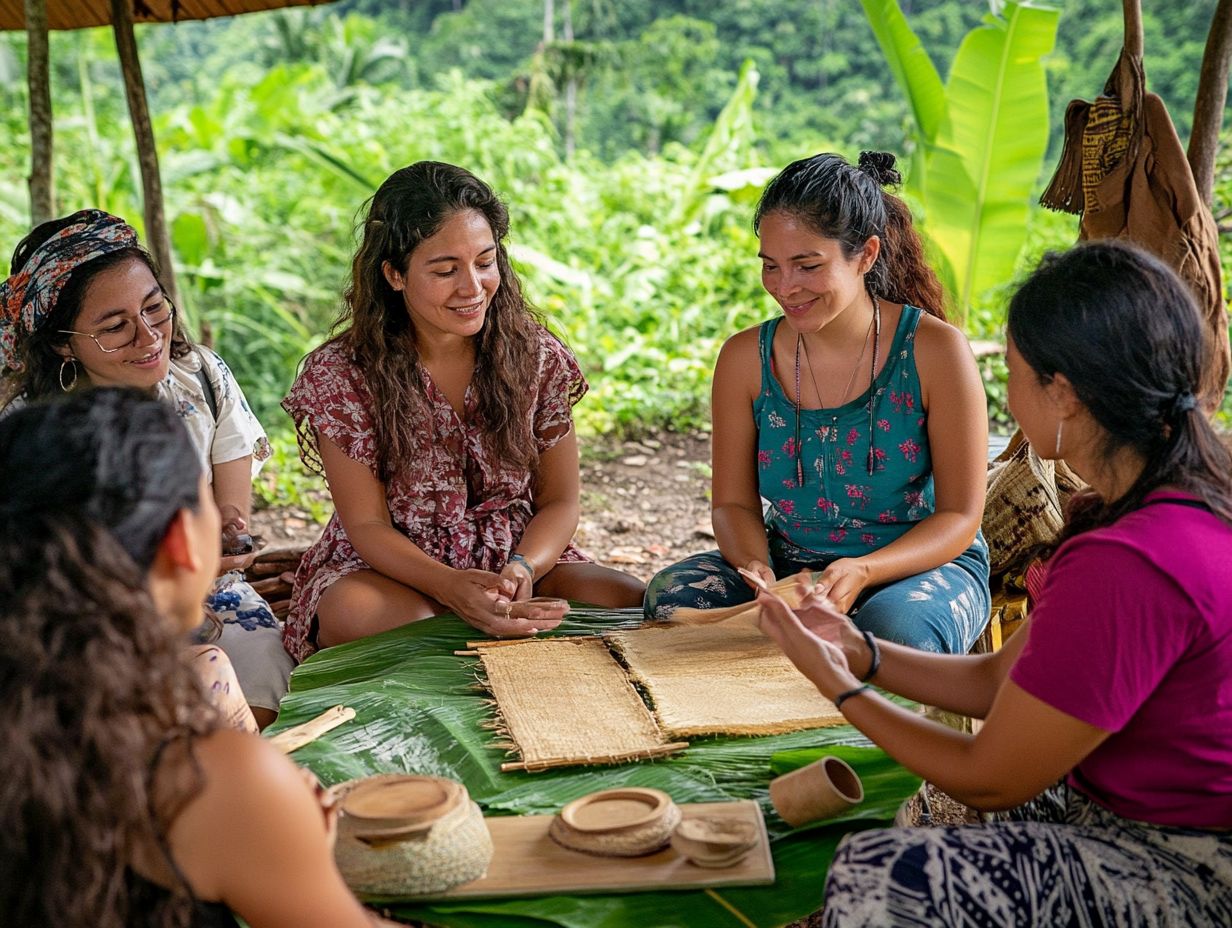
Despite its numerous advantages, cultural exchange often faces obstacles like language barriers and cultural misunderstandings. These challenges can make genuine interactions between tourists and local residents difficult, so it s essential to navigate these complexities for richer experiences.
Addressing Language Barriers and Cultural Misunderstandings
Language barriers and cultural misunderstandings can hinder effective cultural exchange. You can tackle these challenges through proactive communication and cultural sensitivity. This ensures that travelers and residents develop a shared understanding.
When engaging in diverse cultural interactions, prioritize understanding and respect. Traveling with an open mind helps you immerse yourself in new environments, creating deeper connections. Use non-verbal cues and technology, like translation apps, to enhance communication. Actively listen to locals to promote mutual respect and enrich your experience. Being aware of different cultural norms ensures that everyone feels valued, creating a truly enriching atmosphere. Additionally, consider the importance of eco-conscious travel education to make your travels more meaningful.
As a traveler, embrace the responsibility of being an ambassador for your culture while honoring those you meet. This approach leads to meaningful exchanges that nurture global understanding.
Overcoming Preconceived Notions and Stereotypes
Overcoming preconceived notions and stereotypes is crucial for fostering genuine cultural exchange. This paves the way for authentic interactions and a deeper appreciation of local culture.
Approach new destinations with an open mind to engage with diverse communities meaningfully. This mindset allows you to go beyond surface-level observations and explore the rich nuances that define each culture.
By actively listening to locals, asking thoughtful questions, and immersing yourself in local customs, you can build trust and encourage dialogue. Being aware of your biases and challenging unjust stereotypes leads to more rewarding experiences.
These practices not only enhance your journey but also contribute to the sustainable development of tourism, benefiting both you and the host community.
Frequently Asked Questions
What is cultural exchange?
Cultural exchange is the process of sharing and learning about different cultures through interaction and immersion. It involves exchanging knowledge, beliefs, customs, and practices with people from diverse backgrounds.
Start planning your cultural exchange today for a journey that will change your perspective!
Why is cultural exchange important?
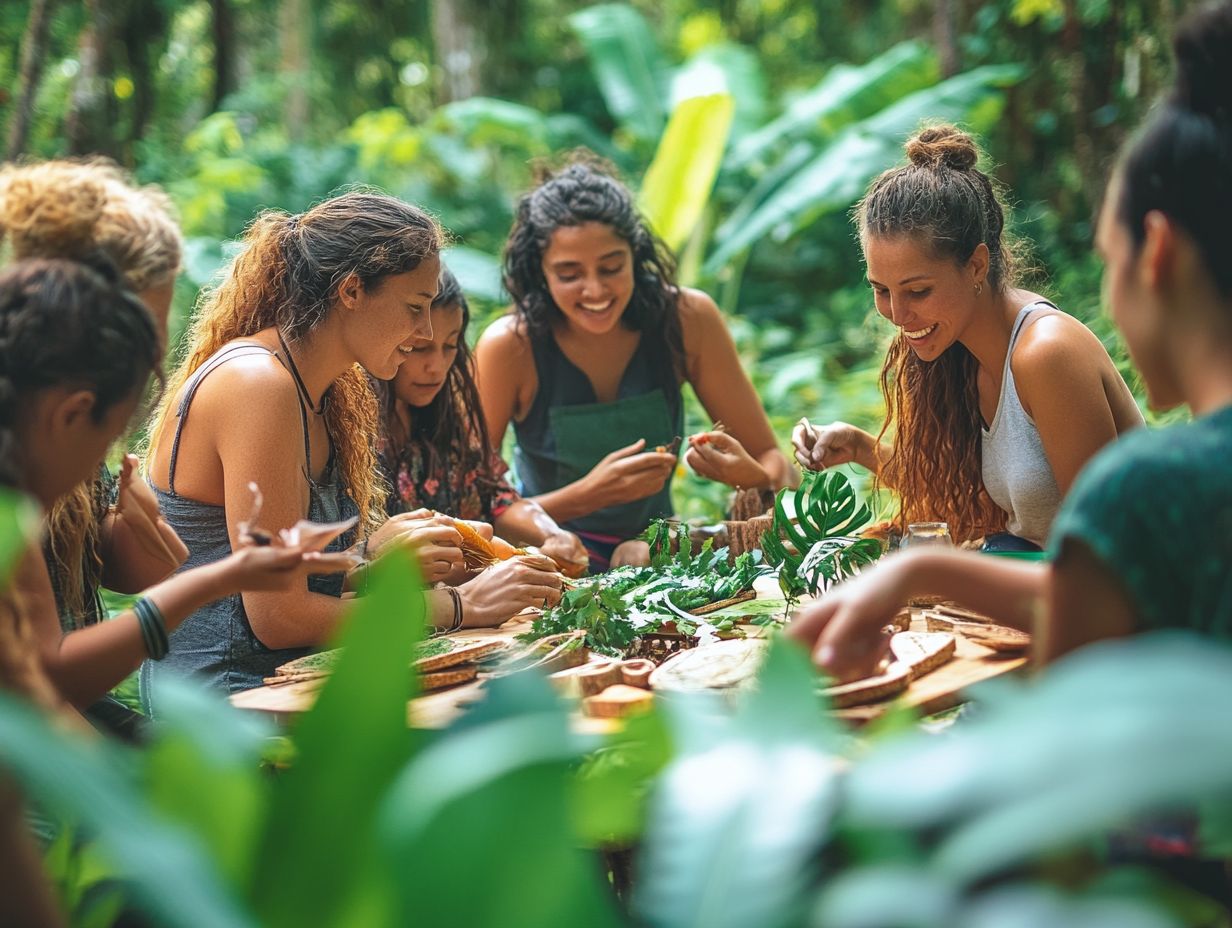
Cultural exchange promotes understanding and respect for diversity. It breaks down stereotypes and fosters global citizenship.
This process leads to personal growth and learning through exposure to new perspectives and ways of life.
What is the role of learning in cultural exchange?
Learning is vital in cultural exchange. It helps individuals understand different cultures, customs, and traditions.
Such knowledge encourages meaningful and respectful interactions with diverse backgrounds.
How does eco-conscious travel contribute to cultural exchange?
Eco-conscious travel focuses on sustainable practices that protect the environment and benefit local communities. This means reducing waste and supporting local businesses.
By choosing eco-conscious travel, you can enjoy and learn from local cultures while preserving them for future generations.
What are some ways to engage in cultural exchange while traveling?
Engage in cultural exchange by participating in homestays or joining local events. Try the local cuisine and learn a few phrases in the language!
Be curious and respectful when meeting people from different cultures.
How can cultural exchange through travel benefit both travelers and host communities?
Cultural exchange benefits everyone involved. It promotes understanding and respect while supporting local economies.
This experience can lead to personal growth and memorable moments for both travelers and host communities.




